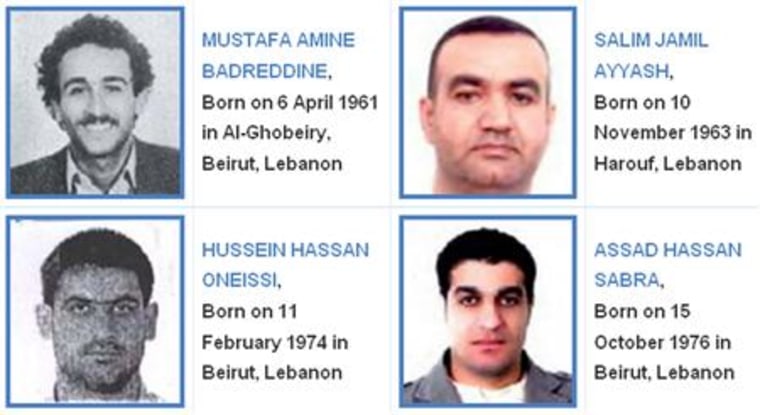Four Hezbollah suspects in the killing of Rafik al-Hariri were linked to the attack largely by circumstantial evidence gleaned from phone records, according to an indictment published Wednesday after a six-year investigation that polarized Lebanon.
The Shiite Muslim group Hezbollah — which is backed by Iran and Syria — has denied any role in the 2005 bombing which killed Hariri, a billionaire Sunni Muslim politician, and 21 other people on the Beirut seafront.
Sealed arrest warrants for the men were issued in June by a U.N.-backed tribunal, setting the stage for the case to go to trial, but none of the four has been detained by Lebanese authorities and Hezbollah says they will never be arrested.
"The four accused participated in a conspiracy with others aimed at committing a terrorist act to assassinate Rafik Hariri," said the 47-page indictment released by the Netherlands-based Special Tribunal for Lebanon.
Hariri's killing plunged Lebanon into a series of political crises and assassinations that led to clashes in May 2008, and there were fears that sectarian tensions would revive in a country still scarred by its 1975-1990 civil war.
Hezbollah, both a political movement and guerrilla army, toppled the government of Hariri's son, Saad al-Hariri, in January after he resisted calls to renounce the tribunal.
Hariri called on Hezbollah leader Hassan Nasrallah to take a "historic stance" and respond to the publication of the indictment by announcing full cooperation with the tribunal so that the suspects could be extradited and face trial.
"What is required of Hezbollah's leadership is simply to announce their disengagement with the accused," Hariri said.
But Nasrallah dismissed the indictment, saying it contained no proof of what he said were fabricated accusations.
"This (indictment) is based on inference and analysis, not direct evidence," Nasrallah said. "It is based on circumstantial evidence whose credibility is contested."
Nasrallah vowed in July that the four suspects would never be arrested, "even in 300 years", saying the tribunal was a tool of U.S. and Israeli policy. But he also said the indictment would not push Lebanon into civil strife.
Phone networks
The suspects are Mustafa Amine Badreddine, a senior Hezbollah figure and brother-in-law of slain Hezbollah commander Imad Moughniyeh, as well as Salim Jamil Ayyash, Hussein Hassan Oneissi and Assad Hassan Sabra.
The indictment said Badreddine served as overall commander of the operation while Ayyash coordinated the assassination team. Oneissi and Sabra were part of the conspiracy and prepared a false claim of responsibility, it said.
Still partly redacted, the pre-amble to the indictment said the case "is built in large part on circumstantial evidence" but said that such evidence could in some cases be more compelling than a case based on witness testimony.
It identified five networks of telephones used in the buildup to Hariri's killing, and set out a detailed account of the days and hours leading to the detonation of 2.5 tons of explosives by a suicide bomber in a Mitsubishi van, which struck Hariri's convoy as it drove along the Beirut seafront.
The "red network," used by members of the assassination team, was "operational from 4 January 2005, until it ceased all activity 2 minutes before the attack on 14 February 2005," the indictment said.
The location of those phones, and of another "blue network," showed surveillance of Hariri on at least 15 days before he was killed, it said. The last 33 calls from the phones were mostly in areas where Hariri was in the two hours before his death.
A little over an hour after the explosion, Oneissi and Sabra made calls to an international news agency and an Arabic satellite station claiming responsibility in the name of a fictional group, "Victory and Jihad in Greater Syria."
Media reports last year predicted the indictment would be based on phone records. Nasrallah has cast doubt on any case relying on telephone calls, saying Israel had successfully penetrated Lebanon's telecoms network and could falsify data to implicate his group.
Prosecutor Daniel Bellemare said publication of the indictment "answers many questions about the ... attack."
"The full story will however only unfold in the courtroom, where an open, public, fair and transparent trial will render a final verdict," he said.
